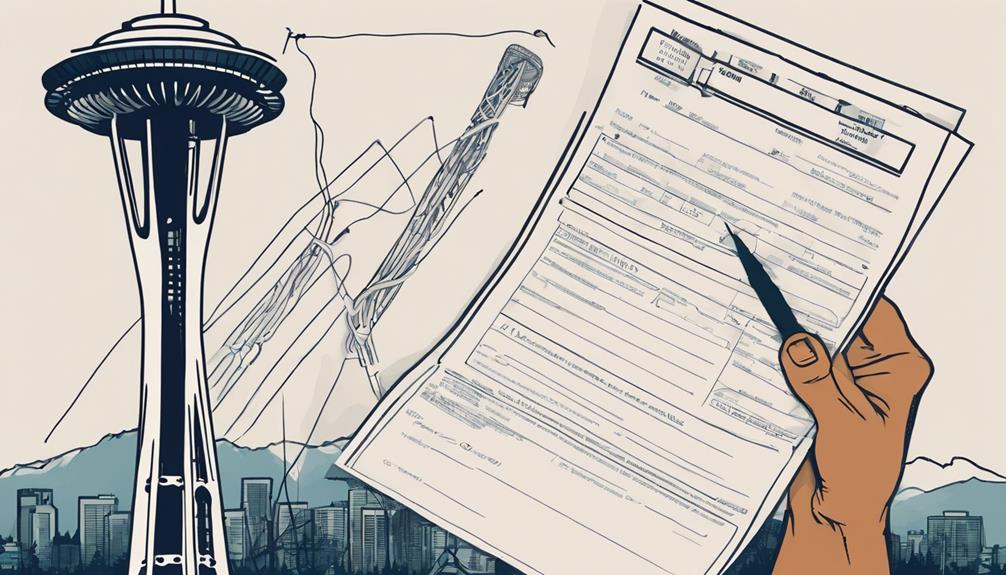If you're an electrical or communications contractor in Washington, you've likely encountered the $4,000 bond requirement. This bond acts as a financial safety net, ensuring you comply with local laws while enhancing your credibility. But what exactly does this mean for your business? Understanding the specifics of this bond, from eligibility to renewal, can significantly impact your operations and client relationships. There's more to explore regarding the benefits and common misconceptions about this bond that could influence your decision-making.
Understanding the Bond Requirement

When you're diving into the world of contracting in Washington, understanding the bond requirement is crucial. The state mandates that electrical and communications contractors obtain a $4,000 bond to operate legally. This bond acts as a safety net, ensuring that you adhere to local laws and regulations.
If you fail to meet your contractual obligations or violate any laws, the bond provides a financial resource for affected parties to seek compensation. In addition, similar to the Louisiana Surety Bonds, this bond helps ensure compliance with state regulations.
You'll need to apply for this bond through a surety company, which will assess your financial stability and business practices before issuing it. Remember, the bond isn't just a formality; it demonstrates your commitment to ethical practices and protects both you and your clients.
If you ever need to make a claim against your bond, it could lead to increased premiums or difficulties in securing future bonds.
In Washington, the bond requirement isn't just a hurdle; it's a vital aspect of establishing your credibility as a contractor. So, make sure you understand the implications of the bond and how it can impact your business in the long run.
Benefits of the ,000 Bond
The $4,000 bond offers several advantages that can significantly benefit your contracting business in Washington. First, it enhances your credibility and trustworthiness in the eyes of clients. When potential customers see that you have a bond, they know you're committed to following state regulations and maintaining high standards.
Additionally, having this bond can streamline the bonding process for contractors, making it easier to navigate the requirements and secure projects user-friendly resources.
Furthermore, having this bond can help you secure more projects. Many clients prefer hiring contractors who are bonded, as it provides an extra layer of financial protection. If any issues arise, such as incomplete work or failure to meet contractual obligations, clients can file a claim against your bond.
Additionally, the bond can protect you from financial loss. If a claim is made against you, the bond can cover the costs, allowing you to focus on your work without the worry of unexpected expenses derailing your business.
Lastly, obtaining the bond is often a straightforward process, enabling you to get started on projects quickly. By investing in a $4,000 bond, you're not just meeting legal requirements; you're also positioning your business for growth and success in a competitive market.
Eligibility Criteria for Contractors

To qualify for a contractor bond in Washington, you must meet specific eligibility criteria that ensure your professionalism and reliability. First, you need to be a registered contractor with the Washington State Department of Labor and Industries. This means you must have a valid contractor registration number and comply with all relevant regulations.
Additionally, securing a bond demonstrates your commitment to uphold industry standards and protects against financial loss for your clients, as highlighted in Illinois Surety Bonds.
Next, you'll need to demonstrate that you hold the required licenses for your specific trade, whether it's electrical work or communications. Having the proper licenses not only shows your competence but also helps protect your clients.
Additionally, your financial history plays a role in your eligibility. You'll need to provide proof of good credit and financial stability, as surety companies often assess your creditworthiness before issuing a bond. If you've had any bankruptcies, felonies, or significant legal issues, it could impact your ability to qualify.
Lastly, you should be prepared to pay the bond premium, which is typically a percentage of the total bond amount. By meeting these criteria, you can position yourself as a trustworthy contractor ready to serve your clients effectively.
Steps to Obtain the Bond
Having met the eligibility criteria, you're ready to start the process of obtaining your contractor bond in Washington. First, you need to find a surety company that's licensed to issue bonds in the state. Research and compare different providers to ensure you're getting the best service and terms.
Next, complete the bond application. This usually involves providing personal and business information, including your financial history and experience in the contracting field. Be prepared to supply any necessary documentation, such as your contractor license number and proof of business registration.
After submitting your application, the surety company will evaluate your creditworthiness and may ask for additional information. Once approved, you'll receive a bond quote that outlines the premium and terms.
If you agree to the terms, you'll sign the bond agreement and pay the premium. The surety company will then issue your bond, which you'll need to file with the Washington Department of Labor and Industries.
Make sure to keep a copy for your records. Following these steps will ensure you obtain your contractor bond smoothly and efficiently.
Costs Associated With the Bond

Understanding the costs associated with obtaining a contractor bond in Washington is crucial for budgeting your project. The bond itself generally requires a premium, which is a percentage of the total bond amount. For a $4,000 bond, you might expect to pay anywhere from 1% to 15%, depending on factors like your credit score and business history. This means you could be looking at a cost ranging from $40 to $600.
Additionally, there are other costs to consider. Some surety companies may charge administrative fees, which can add another $50 to $100 to your total expense.
You might also encounter costs for any required documentation, such as proof of your business license or financial statements.
Don't forget about renewal fees if your bond needs to be extended. Having a solid understanding of these potential expenses can help you avoid surprises down the line.
Bond Claims Process
When you encounter a situation that warrants a bond claim, it's essential to know the steps involved in the claims process. First, gather all necessary documentation, including contracts, invoices, and correspondence related to the issue at hand. This evidence will support your claim and clarify the situation.
Next, notify the bonding company about your intent to file a claim. You'll typically need to submit a formal written notice, detailing the nature of the claim and providing your collected documentation. Be sure to check the specific requirements from your bonding company, as they may vary.
After submitting your claim, the bonding company will investigate. They'll review your documentation and may reach out for additional information. It's crucial to respond promptly to any requests during this phase to avoid delays.
Once the investigation is complete, the bonding company will make a decision regarding your claim. If approved, they'll initiate payment up to the bond amount. If denied, you'll receive a written explanation.
In either case, it's wise to keep records of all communications for your reference throughout the process.
Common Misconceptions

Over time, many misconceptions about contractor bonds have emerged, leading to confusion among contractors and clients alike.
One common myth is that a bond is the same as insurance. While both provide financial protection, a bond ensures that you'll adhere to regulations and fulfill contractual obligations, while insurance covers losses from accidents or damages.
Another misconception is that contractors need a bond only for large projects. In reality, many jurisdictions, including Washington, require bonds for various project sizes to protect clients and maintain industry standards.
You might also believe that a bond guarantees your work, but it only protects clients from financial loss if you fail to meet your obligations.
Some think that obtaining a bond is a complex and daunting process. In fact, it's usually straightforward and can often be completed online.
Additionally, there's a belief that bonds are only for large contractors, but smaller businesses also need bonds to build credibility and trust with clients.
Maintaining Your Bond Status
Maintaining your bond status is crucial for ensuring your business remains competitive and trusted in the construction industry. To achieve this, stay informed about the obligations tied to your bond. Regularly review the terms and conditions, as they can change, impacting your responsibilities.
One key aspect is financial stability. Ensure your finances are in good shape, as any significant financial issues could jeopardize your bond status. Keep your credit score healthy; this not only affects your bond but also your ability to secure new contracts.
You should also prioritize compliance with state regulations. Stay updated on any changes in laws affecting electrical or communications work. Regular training and certification for you and your employees can help maintain compliance and demonstrate your commitment to quality.
Don't forget about communication with your bonding company. Establish a good relationship, and be proactive in addressing any questions or concerns. If you anticipate challenges, discuss them with your bond provider early to find solutions.
Renewing Your Bond

Renewing your bond is a vital step in ensuring your business continues to operate smoothly in the construction industry.
You'll need to stay on top of your bond renewal to avoid any lapses that could hinder your ability to work legally. Typically, you should start the renewal process at least 30 days before your bond expires.
First, check the expiration date of your current bond. Then, reach out to your bond provider to initiate the renewal.
They'll likely require updated information about your business, including financial records and any changes in your operations. If your business has grown or changed significantly, you may need to adjust the bond amount or terms.
After submitting the necessary paperwork, be prepared for a potential re-evaluation of your risk profile, which could affect your premium.
Once everything is approved, make sure you receive the renewed bond documentation promptly. Keep a copy for your records and ensure it's easily accessible for future inspections or project bids.
Staying proactive about renewing your bond not only protects your business but also helps maintain your reputation in the industry.
Resources for Contractors
As a contractor, having access to reliable resources can make all the difference in successfully managing your projects and staying compliant with industry regulations.
Utilize local trade organizations, such as the Washington State Electrical Contractors Association, which offers valuable networking opportunities, training, and updates on the latest codes and regulations.
Online platforms like the Washington State Department of Labor & Industries provide essential information about licensing, permits, and safety standards.
Bookmark these sites for easy reference.
Consider investing in software solutions designed specifically for contractors.
Project management tools can streamline your workflow, helping you track budgets, schedules, and communications effectively.
Don't underestimate the power of industry publications.
Subscribing to magazines and journals focused on electrical and communications contracting can keep you informed about trends and best practices.
Lastly, building relationships with suppliers can provide you with insider knowledge on new products and materials.
They can also assist with troubleshooting issues that may arise on the job.
Conclusion
In conclusion, obtaining the $4,000 bond as an electrical or communications contractor in Washington is essential for your credibility and client protection. By understanding the requirements and benefits, you can ensure compliance and build trust within the industry. Remember to maintain your bond status and renew it on time to avoid any disruptions in your business. With the right preparation, you'll be well-equipped to thrive as a responsible contractor in Washington.


